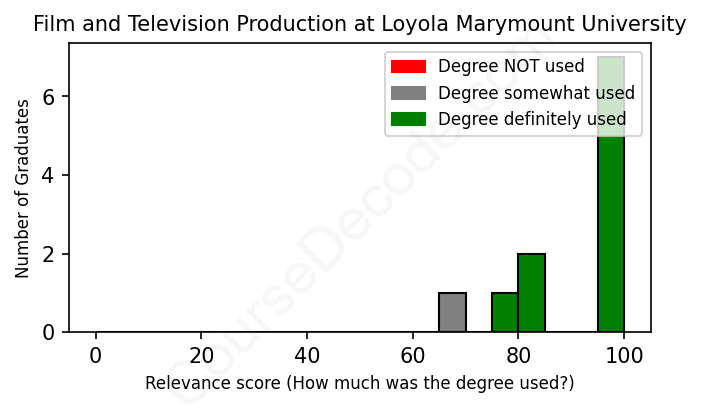
First, some facts. Of the Film and Television Production graduates from Loyola Marymount University we've analyzed , here's how many have used (or NOT used) their degree in their career:

These are estimates based on AI analysis of 11 LinkedIn profiles (see below).
The verdict? Great! Overall, with an average relevance score of 91%, Film and Television Production graduates from Loyola Marymount University have a substantially higher likelihood (+24%) of finding work in this field compared to the average graduate across all fields:
And for comparison, here's the chart for all profiles we've looked at across all degrees.
Also, after graduating, only 9% of these graduates have pursued further education other than another Bachelor's degree (such as a Masters degree or other), compared to the average across all profiles of 35%. This suggests a Bachelors degree is enough for most Film and Television Production graduates, and it's normal to look for work straight after graduation.
See the details:
|
Relevance score: 100% We think this person has gone into a career highly relevant to their degree. We think this person has gone into a career highly relevant to their degree.
DEGREE INFOGraduated in 2014 from Loyola Marymount University with a Bachelor of Arts (B.A.) in Film and Television Production. No other secondary education since. JOB HISTORY SINCE GRADUATIONProduction Manager BuzzFeed May 2022 - Present ABOUTNo information provided. |
The top 10 most common jobs done by the graduates we've analyzed (ranked most common to least) are:
From the analysis of LinkedIn profiles, it's pretty clear that many alumni from Loyola Marymount University's Film and Television Production program have landed jobs that relate strongly to their degree, particularly in roles like editors, post-production supervisors, and various positions at places like Amazon Studios, BuzzFeed, and multiple film sets. A big chunk of these positions involves hands-on editing, production coordination, and managing various stages of film and television production. For example, roles like Post Production Supervisor and A/V Producer showcase a direct application of the skills and knowledge gained during their studies, pointing to a successful trajectory in the industry.
However, it's also evident that not all graduates have secured roles that align tightly with their degree. Some have taken on jobs that stray from film and television production, such as English training or more administrative roles. But overall, the majority of alumni are finding their way into positions that make good use of what they learned, confirming that the program prepares them quite well for the competitive field of film and TV. In short, while some grads have veered off course, a solid number are right in the mix of the industry, doing work that feels relevant and impactful.
Here is a visual representation of the most common words in job titles for Film and Television Production graduates (this is across all Film and Television Production graduates we've analyzed, not just those who went to Loyola Marymount University):

When you look at the career trajectories of graduates from Loyola Marymount University’s Film and Television Production program, you can see some pretty clear trends. Right out of school, many of them land roles like production assistants, post-production assistants, or even freelance jobs in a variety of capacities. It’s a pretty typical start in the industry where you often need to work your way up through entry-level positions before you really carve out your niche. For instance, it’s common to see recent graduates working on sets, supporting larger productions, or even diving right into editing and post-production. From this perspective, it seems like many graduates are finding jobs that are relevant to their degrees right after they finish school.
Fast forward five to ten years later, and you start to see a more diverse spread of careers, with some really great success stories. A number of graduates have moved on to senior roles in production and editing, like the ones who work for big companies like Amazon Studios or BuzzFeed. Others have taken on freelance projects or created their own content, suggesting a level of entrepreneurial spirit among the alumni. However, there are also graduates who seem to have drifted into unrelated fields, showing that while some are hitting their stride in the industry, others might not have found the same success. Overall, it’s a mixed bag, but many appear to be engaged in meaningful work connected to film and television, which is a solid outcome for a creative degree like this one.
The Bachelor’s degree in Film and Television Production at Loyola Marymount University, like many similar programs, can be pretty challenging, but it's also super rewarding if you’re passionate about the field. You’ll dive into hands-on projects, which means you’ll spend a lot of time working on your films and shows, learning technical skills, collaborating with classmates, and meeting tight deadlines. There’s a mix of practical work and theory, and while some parts might be easier if you’ve got a knack for storytelling or tech stuff, others can be quite demanding, especially when you're under pressure to create something unique. Overall, it might be a bit tougher than an average degree, but if you're driven and love what you do, that hard work definitely pays off!
Most commonly, in the LinkedIn profiles we've looked at, it takes people 4 years to finish a Bachelor degree in Film and Television Production.
Based on the job histories of these Film and Television Production grads from Loyola Marymount University, it seems like the ones who graduated earlier, especially around 2010, are doing pretty well financially, landing senior roles at major companies like Amazon Studios and Trailer Park Group, which usually pay decent salaries in the industry—probably somewhere in the $70,000 to $120,000 range, if not more. The more recent grads, especially those still doing freelance work or starting out, like the ones from 2014 to 2020, appear to be in a tougher spot, with some entry-level positions that often pay less than $50,000 a year. Overall, it looks like if they stick with the industry and gain more experience, the potential to earn good money is definitely there, but those just starting out might have to hustle a bit more to reach that level.
Here is a visual representation of the most common words seen in the "about" section of LinkedIn profiles who have a Bachelor degree in Film and Television Production (this is across all Film and Television Production graduates we've analyzed, not just those who went to Loyola Marymount University). This may or may not be useful:

Here are all colleges offering a Bachelor degree in Film and Television Production (ordered by the average relevance score of their Film and Television Production graduates, best to worst) where we have analyzed at least 10 of their graduates:
| College | Score | Count |
|---|---|---|
 Loyola Marymount University Loyola Marymount University
|
91 | 11 |